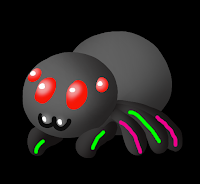1, Have a creature with 6 or 8 legs
 I will be using my spider from my story animation. I know my spider looks like it has only 5 legs but that's because the other 3 legs are behind the rest of the body, so I decided not to show them. It doesn't really matter if it has 6 or 8 legs, because the middle pair of legs will just be able to move on its own. I have highlighted the legs that will eventually be paired together, since arachnids and insects legs move like human legs, but in pairs.
I will be using my spider from my story animation. I know my spider looks like it has only 5 legs but that's because the other 3 legs are behind the rest of the body, so I decided not to show them. It doesn't really matter if it has 6 or 8 legs, because the middle pair of legs will just be able to move on its own. I have highlighted the legs that will eventually be paired together, since arachnids and insects legs move like human legs, but in pairs.2, Pairing the legs
The legs can be paired together using the whip tool in After Effects. Drag the whip tool from the middle green leg to the front green leg, and the back pink leg to the middle pink leg. Now when you set up your key frames on the first and second legs, all of the other legs will follow.
 3, Key frames
3, Key frames
The key frames on a walk cycle make the shape of a "D" on its side when looking at the path. Create a key frame where the first leg is moved to the right a bit, then another with the leg moved up and to the left, then another with the leg moved down on the same plane as the first key frame to the left. Copy and paste the first key frame so that the leg goes back to where it originally was. You now have a full cycle.
 4, Copying and pasting key frames
4, Copying and pasting key frames
Once you have your key frames for the first set, all you have to do is copy and paste the frames from the first set to the second set, and then move them so that those frames start in the middle of the first frames, so that your legs don't move at the same time. If you make more copies of the frames you can have a longer walk cycle.
5, Watch your walk cycle
Your walk cycle should look similar to mine. Notice that the legs move opposite of each other. I hope this tutorial helped!
No comments:
Post a Comment